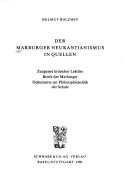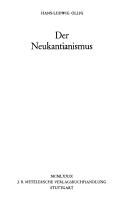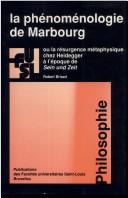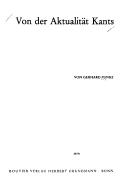| Listing 1 - 10 of 15 | << page >> |
Sort by
|

ISBN: 3796508391 9783796508394 Year: 1986 Volume: 2 Publisher: Basel Schwabe
Abstract | Keywords | Export | Availability | Bookmark
 Loading...
Loading...Choose an application
- Reference Manager
- EndNote
- RefWorks (Direct export to RefWorks)
History of philosophy --- Marburg school of philosophy --- Neo-kantianism --- Ecole de Marburg --- Néo-kantisme --- Cohen, Hermann, --- Natorp, Paul, --- Cohen, Hermann --- Natorp, Paul --- Marburg Neo-Kantianism --- Philosophy, German --- Neo-Kantianism --- Néo-kantisme --- Cohen, Hermann.
Book
ISBN: 9781107032576 9781139506717 Year: 2015 Publisher: New York : Cambridge University Press,
Abstract | Keywords | Export | Availability | Bookmark
 Loading...
Loading...Choose an application
- Reference Manager
- EndNote
- RefWorks (Direct export to RefWorks)
Theory of knowledge --- Neo-kantianism. --- Néo-kantisme --- Néokantisme --- Néo-kantisme --- Néokantisme.
Book
ISBN: 9783787343522 3787343520 9783787343539 Year: 2023 Publisher: Hamburg : Felix Meiner,
Abstract | Keywords | Export | Availability | Bookmark
 Loading...
Loading...Choose an application
- Reference Manager
- EndNote
- RefWorks (Direct export to RefWorks)
Criticism (Philosophy) --- Positivism --- Critical realism --- Neo-Kantianism. --- Kant, Immanuel, --- Theory of knowledge --- History of philosophy
Book
ISSN: 02497980 ISBN: 9782711622597 2711622592 Year: 2010 Publisher: Paris : Vrin,
Abstract | Keywords | Export | Availability | Bookmark
 Loading...
Loading...Choose an application
- Reference Manager
- EndNote
- RefWorks (Direct export to RefWorks)
Cette étude, la première en France sur la philosophie de Natorp (1854-1924), met en évidence sa spécificité et son évolution. Sa spécificité : Natorp est le seul des néokantiens de l’école de Marbourg à bâtir, au sein de la théorie de la connaissance, une psychologie dont la version définitive, intitulée Psychologie générale, paraît en 1912. Il s’agit d’en établir la configuration, de montrer comment elle se situe relativement à la psychologie scientifique en plein essor et de mettre en évidence l’importance qu’elle a eue dans la constitution de la phénoménologie. La psychologie critique de Natorp est d’abord une méthodologie qui s’interroge sur les conditions d’une connaissance scientifique des processus cognitifs. Elle est ensuite une méthode, la méthode de reconstruction du subjectif à partir de ses objectivations, qui s’oppose à la réduction husserlienne prétendant s’appuyer sur une donation et retrouver une immédiateté subjective pourtant définitivement perdue. Son évolution : Natorp se détourne en effet après la première guerre mondiale de la philosophie marbourgeoise, parce que celle-ci construit sa théorie de la connaissance sur des présupposés ininterrogés et réduit le donné à la pensée du donné. Il en vient à considérer, avec ses derniers textes et dans une perspective qui influencera Heidegger, que la question fondamentale est celle de l’être. C’est pourquoi il construit une ontologie ou logique de l’être qui tente de penser l’altérité dans son immanence au logos.
Natorp, Paul --- Knowledge, Theory of --- Neo-Kantianism --- Psychology --- Philosophy --- Natorp, Paul, --- Psychology - Philosophy --- Natorp, Paul, - 1854-1924 --- Natorp, Paul (1854-1924) --- Critique et interprétation
Book
ISBN: 9780198722205 0198722206 0191789054 Year: 2014 Publisher: Oxford Oxford university press
Abstract | Keywords | Export | Availability | Bookmark
 Loading...
Loading...Choose an application
- Reference Manager
- EndNote
- RefWorks (Direct export to RefWorks)
Frederick C. Beiser tells the story of the emergence of neo-Kantianism from the late 1790s until the 1880s. He focuses on neo-Kantianism before official or familiar neo-Kantianism, i.e., before the formation of the various schools of neo-Kantianism in the 1880s and 1890s (which included the Marburg school, the Southwestern school, and the Göttingen school). Beiser argues that the source of neo-Kantianism lies in three crucial but neglected figures: Jakob Friedrich Fries, Johann Friedrich Herbart, and Friedrich Eduard Beneke, who together form what he calls 'the lost tradition'. They are the first neo-Kantians because they defended Kant's limits on knowledge against the excesses of speculative idealism, because they upheld Kant's dualisms against their many critics, and because they adhered to Kant's transcendental idealism. Much of this book is devoted to an explanation for the rise of neo-Kantianism. Beiser contends that it became a greater force in the decades from 1840 to 1860 in response to three major developments in German culture: the collapse of speculative idealism; the materialism controversy; and the identity crisis of philosophy. As he goes on to argue, after the 1860s neo-Kantianism became a major philosophical force because of its response to two later cultural developments: the rise of pessimism and Darwinism.
History of philosophy --- anno 1800-1899 --- anno 1700-1799 --- Germany --- Neo-kantianism. --- Philosophy, Modern --- Néo-kantisme --- Philosophie --- Kant, Immanuel, --- Influence --- Néo-kantisme --- Influence.

ISBN: 3476101878 Year: 1979 Publisher: Stuttgart Metzler
Abstract | Keywords | Export | Availability | Bookmark
 Loading...
Loading...Choose an application
- Reference Manager
- EndNote
- RefWorks (Direct export to RefWorks)
History of philosophy --- Neo-Kantianism --- -Philosophy, German --- -#GROL:SEMI-1-05'17' Kant --- German philosophy --- Idealism --- Transcendentalism --- Baden school of philosophy --- Marburg school of philosophy --- History --- Philosophy, German --- History. --- #GROL:SEMI-1-05'17' Kant
Book
ISBN: 9782711627561 271162756X Year: 2017 Publisher: Paris Vrin
Abstract | Keywords | Export | Availability | Bookmark
 Loading...
Loading...Choose an application
- Reference Manager
- EndNote
- RefWorks (Direct export to RefWorks)
Somme de contributions analysant le rapport d'E. Kant avec les penseurs de langue anglaise (américains, anglais et écossais), qu'ils lui soient antérieurs ou contemporains. Une partie est consacrée à rendre compte de la réception de la pensée kantienne dans la sphère anglo-saxonne. ©Electre 2018
History of philosophy --- Kant, Immanuel --- United Kingdom --- Kant, Emmanuel, --- Kant, Immanuel, --- Ferrari, Jean --- Kant, Emmanuel --- Mélanges et hommages --- Critique et interprétation --- Philosophy, English --- Influence (Literary, artistic, etc.) --- Neo-Kantianism --- Criticism and interpretation. --- Kant, Immanuel, - 1724-1804 --- Kant, Emmanuel, 1724-1804

ISBN: 2802800795 9782802800798 Year: 1991 Volume: 53 Publisher: Bruxelles : Facultés Universitaires Saint-Louis,
Abstract | Keywords | Export | Availability | Bookmark
 Loading...
Loading...Choose an application
- Reference Manager
- EndNote
- RefWorks (Direct export to RefWorks)
Heidegger, Martin --- Fenomenologie --- Metafysica --- Métaphysique --- Phénoménologie --- Phenomenology --- Metaphysics --- Ontology. --- Space and time. --- Marburg school of philosophy. --- Ontologie --- Espace et temps --- Ecole de Marburg --- Heidegger, Martin, --- #GOSA:V.HedT.HEI.M --- Ontology --- Space and time --- Marburg school of philosophy --- Marburg Neo-Kantianism --- Philosophy, German --- Neo-Kantianism --- Space of more than three dimensions --- Space-time --- Space-time continuum --- Space-times --- Spacetime --- Time and space --- Fourth dimension --- Infinite --- Philosophy --- Space sciences --- Time --- Beginning --- Hyperspace --- Relativity (Physics) --- Being --- Necessity (Philosophy) --- Substance (Philosophy) --- Phénoménologie --- Métaphysique
Book
ISBN: 9780198738848 Year: 2015 Publisher: Oxford, United Kingdom : Oxford University Press,
Abstract | Keywords | Export | Availability | Bookmark
 Loading...
Loading...Choose an application
- Reference Manager
- EndNote
- RefWorks (Direct export to RefWorks)
Sebastian Luft explores the philosophy of culture championed by the Marburg School of Neo-Kantianism. Following a historical trajectory from Hermann Cohen to Paul Natorp and through to Ernst Cassirer, he defends the attractiveness of a philosophical culture in the transcendental vein.
Philosophy and psychology of culture --- Natorp, Paul --- Cassirer, Ernst --- Cohen, Hermann --- Culture --- Kulturphilosophie. --- Marburg school of philosophy. --- Marburger Schule. --- Marburgskolan. --- Neo-Kantianism. --- Neukantianismus. --- Néo-kantisme. --- Philosophie allemande --- Philosophy, German --- Philosophy, German. --- Philosophy, Modern. --- Transzendentalphilosophie. --- École de Marburg. --- Philosophy. --- Cassirer, Ernst, --- Cohen, Hermann, --- Kant, Immanuel, --- Natorp, Paul, --- 1800-1999.

ISBN: 3416014154 Year: 1979 Publisher: Bonn Bouvier
Abstract | Keywords | Export | Availability | Bookmark
 Loading...
Loading...Choose an application
- Reference Manager
- EndNote
- RefWorks (Direct export to RefWorks)
Kant, Immanuel --- Neo-Kantianism --- Idealism --- Transcendentalism --- Baden school of philosophy --- Marburg school of philosophy --- Kant, Immanuel, --- Kant, Emmanuel --- Kant, Emanuel --- Kant, Emanuele --- Kant, I. --- Kānt, ʻAmmānūʼīl, --- Kant, Immanouel, --- Kant, Immanuil, --- Kʻantʻŭ, --- Kant, --- Kant, Emmanuel, --- Ḳanṭ, ʻImanuʼel, --- Kant, E., --- Kant, Emanuel, --- Cantơ, I., --- Kant, Emanuele, --- Kant, Im. --- קאנט --- קאנט, א. --- קאנט, עמנואל --- קאנט, עמנואל, --- קאנט, ע. --- קנט --- קנט, עמנואל --- קנט, עמנואל, --- كانت ، ايمانوئل --- كنت، إمانويل، --- カントイマニユエル, --- Kangde, --- 康德, --- Kanṭ, Īmānwīl, --- كانط، إيمانويل --- Kant, Manuel,
| Listing 1 - 10 of 15 | << page >> |
Sort by
|

 Search
Search Feedback
Feedback About
About Help
Help News
News